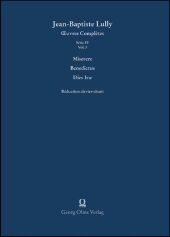 Neuerscheinungen 2017Stand: 2020-02-01 |
Schnellsuche
ISBN/Stichwort/Autor
|
Herderstraße 10
10625 Berlin
Tel.: 030 315 714 16
Fax 030 315 714 14
info@buchspektrum.de |

Noam A. Krieger, Jean-Baptiste Lully
(Beteiligte)
Miserere, Benedictus, Dies Irae
Série IV: Motets, Volume 3. Édition de Jean Paul C. Montagnier. Réduction clavier chant: Noam A. Krieger.
Herausgegeben von Krieger, Noam A.
2017. IV, 204 S. 300 mm
Verlag/Jahr: OLMS 2017
ISBN: 3-487-15584-2 (3487155842)
Neue ISBN: 978-3-487-15584-5 (9783487155845)
Preis und Lieferzeit: Bitte klicken
Bien que Jean-Baptiste Lully n´ait jamais exercé de fonctions officielles à la Chapelle de Louis XIV, il ne composa pas moins de douze motets à grand choeur (ou grands motets), participant ainsi à l´élaboration d´un genre promis à un brillant avenir.
Le Miserere (LWV 25) fut semble-t-il chantée pour la première fois à Paris en l´église des Feuillants de la rue Saint-Honoré, lors de la Semaine Sainte de 1663. Lully livra avec cette partition l´un des premiers modèles achevés du motet à grand choeur et dont Madame de Sévigné déclara qu´" Il y a eu un Libera où tous les yeux étaient pleins de larmes. Je ne crois point qu´il y ait une autre musique dans le ciel ".
Jérôme de La Gorce situe la rédaction de ce Benedictus vers 1663 ou 1664. Nous n´avons trace d´aucune exécution du vivant de son auteur.
Quant au Dies ir‘ (LWV 64/1), il fut composé pour les funérailles de la Reine Marie-Thérèse et chanté à Saint-Denis le 1er septembre 1683. Although Jean-Baptiste Lully never exercised any official function within the chapel of Louis XIV, he composed no fewer than twelve concerted motets for a large choir (grands motets) thus sharing in the development of a genre which was to have a brilliant future.
The Miserere (LWV 25) was sung for the first time in Paris in the church of the Feuillants in the Rue Saint-Honoré in the Holy Week 1663. It is one of the first completed examples of a motet à grand ch‘ur, and of which Madame de Sévigné declared that "Il y a eu un Libera où tous les yeux étaient pleins de larmes. Je ne crois point qu´il y ait une autre musique dans le ciel".
The Benedictus was written around 1663 or 1664, there being no record of any performance during the composer´s lifetime.
The Dies irae LWV 64/1 was composed for the funeral of Queen Marie-Thérèse and performed at Saint-Denis on 1 September 1683.
This first historical-critical edition is based on a study of all surviving sources. As well as full scores, each of which will include a printout of the libretto, performance material and piano scores of the dramatic works and the sacred music will also be published.


